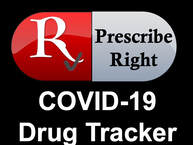|
COVID-19 Vaccines
An FDA review of clinical data for Pfizer and BioNTech’s COVID-19 vaccine found evidence supported 95% efficacy and no major safety concerns. On 12/10.2020, the FDA’s Vaccines and Related Biological Products Advisory Committee voted 17 to 4, with one abstention to recommend an emergency use authorization for BNT162b2 as prophylaxis for COVID-19 infections for patients 16 years and older. Pfizer and BioNTech will monitor for anaphylactic reactions as part of their pharmacovigilance plan after two patients in the U.K. developed reactions after receiving the vaccine. In the Pfizer funded, 43,0448 patient, Phase II/III trial (NCT04368728) BNT162b2 was administered as two 30 mcg immunizations given 21-days apart. BNT162b2 efficacy was found to be 95% (8 cases of COVID-19 vs 162 cases), 28 days after the first dose and 7 days after the second dose. Protection for COVID-19, began around 12 days after the first dose, with 52% efficacy between the first and second doses. Efficacy was consistent across age, gender, race and ethnicity demographics. The most common ADR were mild-to-moderate pain at the injection site, fatigue, and headache. There were few serious ADR and the incidence was similar to placebo. After the second dose, fever developed in 16% of younger patients and 11% of older patients. Pfizer and BioNtech will have 50 million vaccine doses available in 2020 and up to 1.3 billion doses in 2021. BioNTech announced that the COVID-19 vaccine it is developing with Pfizer, BNT162b2, can be stored for up to five-days at 2 to 8 C. The shipping container will keep the vaccine viable for up to ten days if stored at 15 to 25 C without opening and up to 15 days if opened and then re-iced with dry ice. The vaccine is stable for up to six months at -70 C. J&J and Operation Warp Speed are capping the ENSEMBLE trial at 40,000 patients due to a surge in COVID-19 cases that will allow accumulation of at least 154 cases of severe or moderate COVID-19 infection more quickly. The trial was estimated to be fully enrolled at the new participant total in the first week of December. An interim analysis of data from 11,636 patients participating in four trials (NCT04324606, (NCT04400838, NCT04444674, ISRCTN89951424 ) evaluating AstraZeneca’s COVID-19 vaccine (AZD1222 or ChAdOx1 nCoV-19) found the average efficacy for two dosing regimens of the vaccine to be 70% in preventing COVID-19. Giving a half dose as the first immunization and a full dose four weeks later resulted in 90% efficacy (n=2,741), while giving a full dose at both immunizations resulted in 62% efficacy (n=8,895). No safety issues were found. The vaccine can be stored, transported and handled at 2-8 degrees Celsius for at least six months. Sanofi and GSK announced a delay in their COVID-19 vaccine development program when an interim analysis of a 441 patient, Phase I/II trial (NCT04537208) found the vaccine to elicit antibodies comparable to convalescent plasma in patients 18 to 49, but the response in older patients was insufficient. Sanofi and GSK plan to initiate a Phase IIb trial in February 2021 to test a vaccine formulation with a higher antigen content. The Sanofi and GSK vaccine will be compared to a vaccine that has received an EUA. If the trial is successful, a Phase III is projected to be initiated in 2Q21. Clover announced that in a 150 patient, Phase I Australian trial (NCT04405908), Clover’s protein-based COVID-19 vaccine candidate combined with GSK’s vaccine adjuvant, ASO3 induced antibodies in all participants, while the vaccine adjuvanted with Dynavax’s vaccine adjuvant, CpG 1018 induced antibodies in 100% of younger and middle aged adults, but in 88% (7/8) of elderly patients. Clover plans a Phase IIb/III to evaluate the safety and efficacy of SCB-2019 in combination with GSK’s vaccine adjuvant, ASO3, by the end of 2020 and a Phase IIb/III to evaluate the safety and efficacy of SCB-2019 in combination with Dynavax’s vaccine adjuvant, CpG 1018, in the first half of 2021. CpG 1018 is used in Dynavax’s HEPLISAV-B (hepatitis-B) vaccine. COVID-19 Antibodies NIH did not find enough evidence to recommend for or against use of casirivimab plus imdevimab for the treatment of outpatients with mild to moderate COVID-19. Due to the limited supply, use of the drug should be restricted to patients at the highest risk to progress to severe COVID-19. Hospitalized patients should not receive bamlanivimab outside of a clinical trial. Comments are closed.
|
Stay informed, subscribe to the Prescribe Right Pharmaceutical Pipeline Tracker
Archives
January 2023
Categories |
Services |
Company |
Support |
© COPYRIGHT 2015. ALL RIGHTS RESERVED.
|


 RSS Feed
RSS Feed